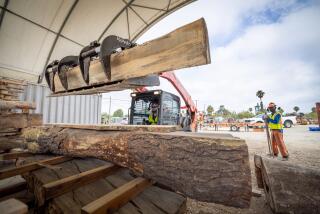Logging Practices of Louisiana-Pacific
- Share via
I cannot recall a more shameless example of distorted, inflammatory journalism than Alexander Cockburn’s column “A Chill Falls on Redwood Summer” (Commentary, May 31) . Cockburn is entitled to his opinion on the proper stewardship of the earth’s natural resources. He is not, however, privileged to advance his beliefs by defaming those who do not share his creed.
In his article, Cockburn implies or directly states that Louisiana-Pacific is responsible for the following: 1) evading the ban on raw log exports from public lands by sawing logs in half and calling them “partly finished”; 2) setting up a large, log-processing mill in Mexico with resultant loss of jobs in Northern California, and 3) killing a Mexican worker by “ordering” him to clear a moving green chain.
Cockburn is either ignorant or a liar to have made these statements.
Louisiana-Pacific does not, as Cockburn alleges, evade the export ban on raw logs from public lands by sawing the logs in half and then shipping them from its Humboldt County facility as “partly finished products.” In fact, Louisiana-Pacific exports only dimension lumber (i.e., 2x4’s, 2x6’s etc.) from its Humboldt dock: no squared timbers or halved logs are exported.
Nor is Louisiana-Pacific exporting jobs by “setting up a large mill in Mexico to process its logs” as Cockburn writes. The less sensational truth is that Louisiana-Pacific’s Mexico operations are limited to planing and air drying (in Baja’s sunny climate) dimensional lumber (2x4’s, 2x6’s, 2x8’s etc.) already manufactured and sawed to dimension in the United States. Unfortunately, for your readers, Cockburn apparently does not much concern himself with the facts.
Finally, contrary to what Cockburn would have his readers believe, Louisiana-Pacific places the highest value on the health and safety of its employees. Our safety record bears this out: The incidence of injuries in Louisiana-Pacific’s workplace is significantly lower than average in the wood products industry. Still, no workplace is accident-proof and despite our efforts, in a work force the size of Louisiana-Pacific’s--some 15,000 employees--unhappy and even tragic accidents will sometimes occur. The accidental death of Fortunato Reyes in our Ukiah facility is one such tragedy.
Cockburn distorts the circumstances of this tragedy to support his thesis that Louisiana-Pacific is a bad corporate citizen, a corporation willing to sacrifice the safety of its employees rather than disrupt production. Louisiana-Pacific did not willfully expose Fortunato Reyes to danger by “ordering” (Cockburn’s word) him to clear a live green chain. Cockburn’s accusation stands in contrast to the state’s accident investigation which has indicated only that Fortunato Reyes failed to pull a “stop” cord before entering a lumber sorter.
Cockburn clearly left journalistic ethics behind in his zeal to smear the reputation of Louisiana-Pacific. Even a modest investigation would have revealed the fraud in his thesis. Louisiana-Pacific is not afraid to confront the truth--sadly, there was little truth to be found in Cockburn’s column.
A newspaper of the stature of The Times owes its readers--and the subjects of articles whose reputations may be sullied thereby--balanced, accurate journalism. If Cockburn isn’t up to the task, perhaps you should find another writer who is.
LEE C. SIMPSON
Vice President-Operations
Louisiana-Pacific Corp., Portland, Ore.
More to Read
Sign up for The Wild
We’ll help you find the best places to hike, bike and run, as well as the perfect silent spots for meditation and yoga.
You may occasionally receive promotional content from the Los Angeles Times.






